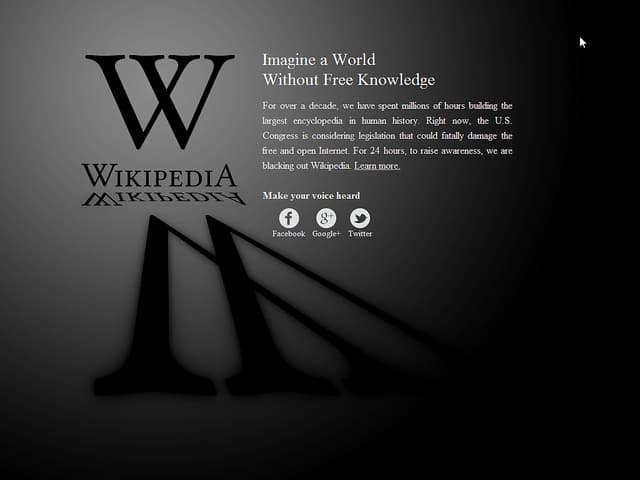Noticed Wikipedia wasn't working in Spain this morning? Here's why

Wikipedia went down in Spain on Wednesday July 4th in protest at an upcoming European Parliament vote on a highly disputed law that could make online platforms legally liable for copyrighted material put on the web by users.
In Spain, Italy and Poland, an explanatory protest statement about the upcoming vote appears when the online encyclopedia is browsed in any of these three country's languages.
The temporary website closure was introduced on July 4th and continued until July 5th around midday.
"The directive would threaten online freedom and would impose new filters, barriers and restrictions to access the web," Wikipedia Spain said in its statement.

"If the proposal was approved in its actual version, actions like sharing news on social networks or accessing news via a search engine would be more complicated on the Internet."
It added that Wikipedia would be "at risk" and asked users to phone their MEPs.
The overhaul of European copyright law is divided into several sections, one of which is the reform criticised by Wikipedia and others who have warned it will lead to blanket censorship by tech giants.
Another reform would force online platforms such as Google and Facebook to pay for links to news content, which news agencies including AFP have hailed as a "major step".
The European Commission has replied saying that "Wikipedia and other online encyclopaedias would not fall within the scope of the Commission's Copyright proposal."
But Wikipedia chief Jimmy Wales and Greens MEP Julia Reda, a leading campaigner on the issue, insist that it will.
Thursday's parliament vote is not final, but only sets out the negotiating position of MEPs.
There then follow negotiations with member states for a final position, during which the full extent of the law and whether it does apply to Wikipedia will be worked out.
Austria, which has just assumed the EU's six-month rotating presidency, has said this will be difficult, so there will have to be some sort of compromise.
Comments
See Also
In Spain, Italy and Poland, an explanatory protest statement about the upcoming vote appears when the online encyclopedia is browsed in any of these three country's languages.
The temporary website closure was introduced on July 4th and continued until July 5th around midday.
"The directive would threaten online freedom and would impose new filters, barriers and restrictions to access the web," Wikipedia Spain said in its statement.

"If the proposal was approved in its actual version, actions like sharing news on social networks or accessing news via a search engine would be more complicated on the Internet."
It added that Wikipedia would be "at risk" and asked users to phone their MEPs.
The overhaul of European copyright law is divided into several sections, one of which is the reform criticised by Wikipedia and others who have warned it will lead to blanket censorship by tech giants.
Another reform would force online platforms such as Google and Facebook to pay for links to news content, which news agencies including AFP have hailed as a "major step".
The European Commission has replied saying that "Wikipedia and other online encyclopaedias would not fall within the scope of the Commission's Copyright proposal."
But Wikipedia chief Jimmy Wales and Greens MEP Julia Reda, a leading campaigner on the issue, insist that it will.
Thursday's parliament vote is not final, but only sets out the negotiating position of MEPs.
There then follow negotiations with member states for a final position, during which the full extent of the law and whether it does apply to Wikipedia will be worked out.
Austria, which has just assumed the EU's six-month rotating presidency, has said this will be difficult, so there will have to be some sort of compromise.
Join the conversation in our comments section below. Share your own views and experience and if you have a question or suggestion for our journalists then email us at [email protected].
Please keep comments civil, constructive and on topic – and make sure to read our terms of use before getting involved.
Please log in here to leave a comment.